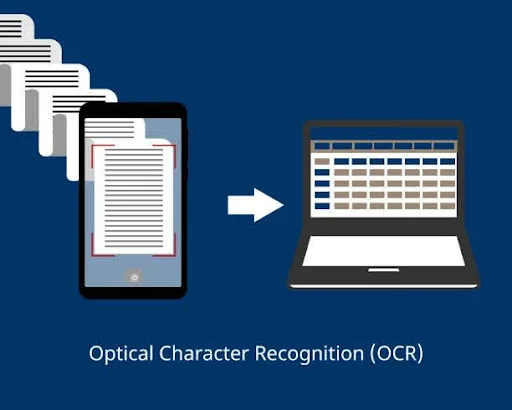The banking industry is heavily regulated because it handles large sums of money. In 2022 alone, the banking sector generated about $4,962 billion in revenue. Banks hold a lot of sensitive information and financial assets for many customers, which makes them targets for unauthorized financial attacks. To protect this data and operate efficiently, banks use advanced solutions like OCR technology. OCR, or optical character recognition, plays a crucial role in digitizing printed documents. It uses artificial intelligence to accurately convert paper-based information into digital formats. This helps banks provide effective services and obtain accurate information quickly, enhancing their operations and security measures.
Optical Character Recognition: Transforming Banking Application Processes
Optical character recognition (OCR) is a tool that turns handwritten documents into digital files that computers can read. In banking, OCR helps by taking printed bank statements and converting them into digital data. This makes it easier to manage and use the information in those statements. OCR also helps prevent fraud by checking deposit checks and verifying financial transactions. By storing these important documents electronically, it keeps them safe. Using OCR speeds up the process of bringing new customers on board accurately because automation reduces mistakes when checking documents. It also helps banks check and confirm information from other companies they work with before giving them money. This helps prevent fraud and keeps accounts safe from being taken over or used improperly.
Revolutionizing Banking Efficiency with Optical Character Recognition
OCR technology is a way to extract data from printed documents by categorizing the information into dark and light regions. The dark region contains the alphanumeric characters that need verification, while the light region acts as the background. Using advanced technology, OCR scans and processes the document by:
Document Scanning and Pre-Processing: First, the printed document is scanned and converted into a format that computers can read. The scanner identifies the dark and light regions and checks for any noise or alterations in the document.
Character Recognition: Next, OCR technology validates each character on the document. It recognizes the shape and pattern of the bank statement characters and compares them with stored data in the bank’s system. Machine learning helps to filter out unnecessary information, making data extraction faster.
Editing and Post-Processing: Finally, the OCR system corrects any errors in the document and highlights any information that couldn’t be identified. The validated data is then converted into a format like an Excel sheet, which can be easily checked and confirmed using deep learning technology.
Overall, OCR technology helps banks and other organizations quickly and accurately convert, verify, and manage printed documents, enhancing efficiency and reducing the risk of errors or security breaches.
Securing Loan Documents with OCR Scanning Technology
Banking institutions need to verify many documents before approving a loan. They use automated OCR services to recognize documents like financial statements, ID proofs, income verification, transaction history, and address proofs from borrowers. By setting criteria in OCR technology, banks can automate the assessment of each individual’s risk.
Automated loan processing reduces the repetition in document handling and speeds up loan approvals, improving the banking experience for both borrowers and lenders. OCR scanning also cuts operational costs for banks because loans can be processed remotely. Since everything is handled automatically, there’s less chance of mistakes, and decisions are made swiftly. This makes the loan application process smoother and more efficient.
Enhancing Transaction Security: OCR Compliance for Fraud Prevention
OCR technology helps banks comply with regulations by securing bank statements and transactions from risks like money laundering and identity theft. It prevents duplicate data entries, which can indicate attempts to impersonate someone. Optical character recognition also ensures that data is kept confidential by storing extracted information in encrypted formats. This makes it harder for imposters to access or misuse sensitive information, helping to prevent unauthorized attacks and money laundering attempts.
Automated Validation of Unstructured Documents: OCR Processing Technology
OCR technology uses advanced deep learning techniques to extract information from documents that could be more well-organized or structured. Handwritten documents or paper-based records can be difficult to process because the information is not neatly arranged. OCR scanners solve this problem by using sophisticated technology that can accurately read and interpret paper receipts, handwritten contracts, and other types of paper-based business documents. This improves accuracy and efficiency in handling documents that are not traditionally easy to work with.
The Bottom Line
OCR technology improves how banks handle financial tasks. It efficiently extracts data, automates loan processing, and safeguards transactions from unauthorized access. OCR works by recognizing and analyzing documents through character recognition and pattern scanning. It can accurately extract information from unorganized documents, ensuring quick and precise loan processing. This technology enhances the banking experience for businesses and customers alike, making financial activities smoother and more secure.
